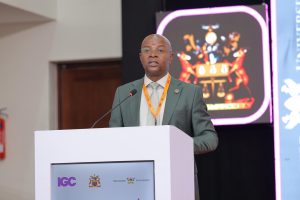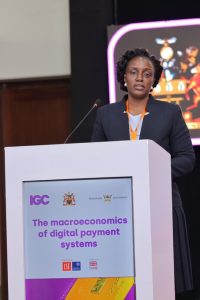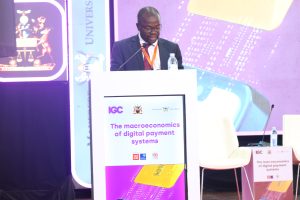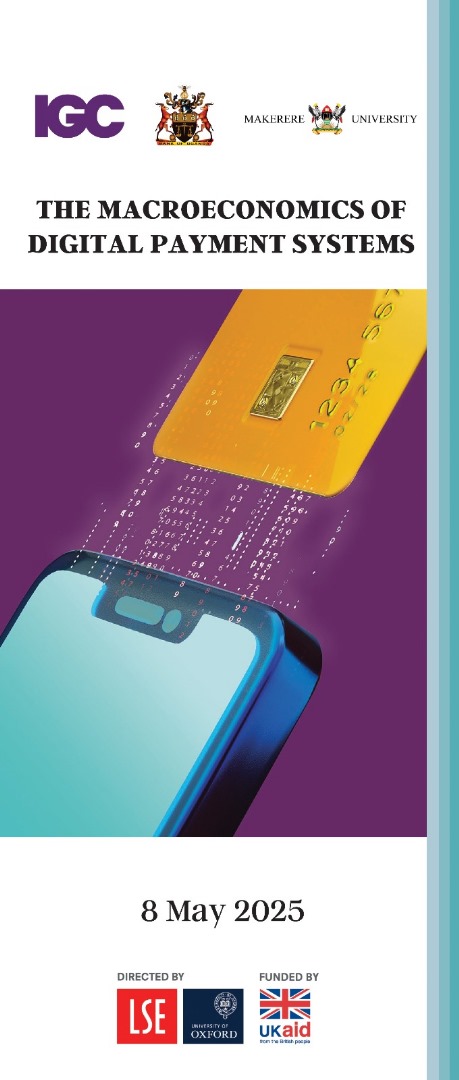On 8th May 2025, the School of Economics under the College of Business and Management Sciences (COBAMS) hosted the Macroeconomics of digital payment system conference at Makerere University.
The conference was organized in collaboration with the Bank of Uganda (BOU) and International Growth Centre (IGC), to promote use of digital financial services.
The conference was timely, coming at a time, when the world is experiencing a shift from moving with cash to accelerated digital transformation. The development has since penetrated the financial services market, promoting financial inclusion because of being secure and convenient. Users have since observed an increase in speed, accuracy and reduction of transaction costs.
Uganda has made great strides in the adoption of digital technology. During the conference, the participants noted that the mobile money payment systems expedited the transfer of money. It is very fast, quick, convenient and affordable. The conference provided a platform to reflect on how that transition has happened and its impact on the economy.

The Principal of the College of Business and Management Sciences (CoBAMS)-Prof. Edward Bbaale
Prof. Edward Bbaale, the Principal for COBAMS, welcomed delegates at the university and assured them that the conference would generate transformation and change in the business sector. He noted that digital payments have emerged as a critical tool in shaping the macroeconomic landscape of developing economies.
“The shift from cash to digital modes of transaction has profound implications for taxation, monetary policy, financial inclusion, and the efficiency of the financial system as a whole,” he observed.
He noted that the conference highlights the challenges of digital payments which have an implication to businesses; issues like mobile money taxation, digital financial service costs, interoperability, infrastructure gaps and remittance payments.
The conference therefore addressed the gap of mobile money taxation among other digital financial services and how they left out voices of the most affected-the small business owners. The participants called upon relevant authorities and stakeholders to consider making a redress.
“Uganda, like many of its regional counterparts, is standing at the crossroads of technological change and policy innovation. As digital financial services expand, we must understand their effects. This is not only a research imperative-it is a national necessity.”
Bank of Uganda expressed commitment of supporting digital financial services and creating avenues for accelerated development as the country embraces digital payment systems.
Ms Doreen Rubatsimbira, the Head, Monetary Policy Analysis at BOU, said a technical team on block chain technology has been instituted to extend support to the journey of realizing digital financial services.
“We have also explored the visibility of the central bank digital currency and constituted a technical working group on block chain technology as a way of leveraging transformative technologies for the financial sector,” she stated.

On behalf of BOU, Ms. Rubatsimbira applauded Makerere University for their continued partnership on a number of activities that contributes to the economic growth of the country.
The university has worked with Bank of Uganda on different occasions because of the shared academic and policy goals. “This collaboration has led to a generation of economists and policymakers,” she said.
International Growth Centre Senior Country Economist, Nhial Kuch, said there is a steady progress in adoption of digital payment systems. As an organization, they are looking at providing more funding for evidence-based research to help policymakers come up with adjustments in policies that don’t clash with financial inclusion.
“When we think about tax policy, we must make sure that it is not contradicting other policies, the government is pursuing i.e. financial inclusion or access to innovative services or digital payments,” he said.
He underscored the significance of IGC funding towards evidence based research, noting that they funded the paper on mobile money tax, which is paying off by raising important dialogue that brings together researchers and policymakers, to sit in one room and address these issues and come up with some policy interventions.
“We also funded research on the Electronic Receipting and Invoicing System (EFRIS) which was creating confusion especially among business owners, but our intervention helped in interpretation of that tax,” Kuch added.

Prof. Ibrahim Okumu, the Dean, School of Economics, appreciated all partners especially BOU and IGC for their joint support to organize a colourful conference. He stressed that this kind of collaboration underscores the power of partnership in driving research, capacity building and evidence-informed policy.
Through this partnership with the Bank of Uganda, Makerere University is scheduled to launch the Master of Science in Economic and Investment Modelling in August 2025, a program that will help strengthen the analytical capacity needed for sound public investment decisions.
Written by: Noeline Nabukenya, Guest Writer.

